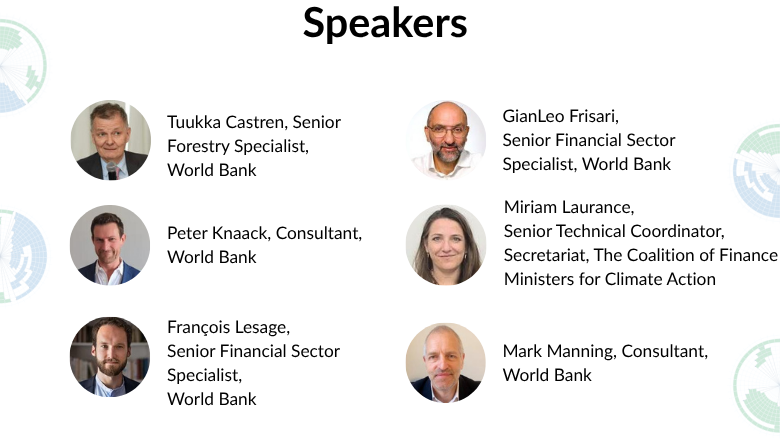- Overview
- Agenda
- Speakers
Planning the transition to a sustainable future is an essential task for governments, financial institutions, and real economy corporates alike. The development and publication of a transition plan helps them identify and manage transition risks, improve resilience to economic and environmental shocks, seize the opportunities a sustainable, low-carbon economy provides, and attract investment for the transition.
National governments often lay out their sustainable development strategy in a variety of documents (NDCs, long term development strategies, budget plans, sectoral strategies) rather than a single transition plan. But is the national transition planning process robust, credible, and detailed enough to attract climate finance domestically and from abroad?
Financial and non-financial institutions in a growing number of jurisdictions are publishing transition plans to clarify the firm’s strategy for managing environmental risks and opportunities. How does national planning help institutions align their own transition strategies and support the real economy?
This webinar provides insight into ongoing World Bank cooperation on transition planning with authorities in Uganda, along with relevant work at the Coalition of Finance Ministers for Climate Action.
09:00 – 09:05 |
Welcome and opening remarks, Tuukka Castren, Senior Forestry Specialist, World Bank |
09:05 – 09:15 |
National transition planning in Uganda.
Highlights of a gap analysis that assesses Uganda’s transition planning work against a benchmark of 16 recommendations for global best practice in national transition planning. Which institutions (laws, regulations, plans) are already in place for a credible transition, and which institutions need strengthening to attract domestic and foreign investors?
Peter Knaack, Consultant, World Bank |
09:15 – 09:35 |
Discussion: National transition planning as an enabler for financial sector and real economy action
How can national transition planning create the enabling conditions for effective financial sector engagement and real-economy transition? What do financial institutions and corporates expect from the government? What can finance ministries deliver?
Moderator: GianLeo Frisari, Senior Financial Sector Specialist, Long-term Finance, World Bank |
09:35 – 09:55 |
Q&A |
09:55 – 10:00 |
Closing Remarks |
Tuukka Castren is a Senior Forestry Specialist and works on forest law enforcement and governance through the Program on Forests (PROFOR) in the World Bank Agriculture and Environmental Services Department. Prior to working at the World Bank, he was with the Ministry for Foreign Affairs, Department for Development Policy in his native Finland, where he first joined the Ministry as an economic adviser, and later became the senior adviser for development policy. He also worked in private sector forest consulting for many years earlier in his career. Mr. Castrén has university degrees both in forestry and economics from the University of Helsinki. |
Peter Knaack is an Adjunct Professor at the School of International Service, American University in Washington, DC, and an Associate at the Council on Economic Policies, a Swiss think tank. He is also a Research Associate at the Centre for Sustainable Finance at SOAS, University of London, and a consultant at the World Bank. Peter’s research focuses on financial inclusion, climate finance, and global financial governance. He graduated from the University of Southern California with an MA in Economics and a PhD in International Relations. |
François Lesage is a Senior Financial Sector Specialist in the Finance, Competitiveness, and Investment Global Practice of the World Bank Group. He advises governments and financial regulators in emerging markets and developing economies on policies to green their financial systems. He also coordinates the World Bank’s engagement with the Network of Central Banks and Supervisors for Greening the Financial System (NGFS) and has led the publication of key NGFS reports on transition planning. Before joining the World Bank, François headed the risk management unit at Banque de France, overseeing risks related to the monetary policy operations, reserve management and own funds. He previously held positions at the European Central Bank and the French Prudential Supervisory Authority, where he participated in international negotiations on financial regulations. |
Mark Manning is an independent advisor on sustainable finance, working with a number of public interest organisations on matters such as transition planning, transition finance, sustainability reporting and sustainable investment. Alongside occasional missions with the World Bank, Mark holds a Visiting Senior Fellow position with the Centre for Economic Transition Expertise at the London School of Economics and Political Science and has a Regulatory Affairs Specialist role with the IFRS Foundation. Mark has other advisory engagements with Chapter Zero, the World Business Council for Sustainable Development and the International Organisation of Standardisation (ISO).
Mark spent much of his prior career in the official sector, holding various senior policy and research roles in central banking and securities regulation in London and Sydney – with the Bank of England, the Reserve Bank of Australia and the UK’s Financial Conduct Authority (FCA). Mark represented these organisations in both domestic and international policy fora, including IOSCO’s Sustainable Finance Taskforce. Mark holds Master’s degrees in Economics and Finance, from University College London and London Business School, respectively. |
GianLeo Frisari is a Senior Financial Sector Specialist at the World Bank. He is an experienced professional with expertise in hedge fund research, portfolio management, financial market analysis, environmental and carbon finance, and energy and commodities markets. He holds a PhD in Science and Management of Climate Change from Università Ca’ Foscari Venezia and an MSc in International Economics from Bocconi University.
|
| Miriam Laurance is Senior Technical Coordinator, Secretariat, The Coalition of Finance Ministers for Climate Action. |
FAQs
Yes. Please use the Sign Up button to register. This confirms your attendance for either the in-person event or access to the livestream. Once registered, you’ll receive an email with event access details, location or login instructions, and timely reminders.
The event recording will be available on this page shortly after it concludes. If you registered via the Sign Up button, you’ll receive a follow-up email with a link to watch the replay and access any resources shared during the event.

